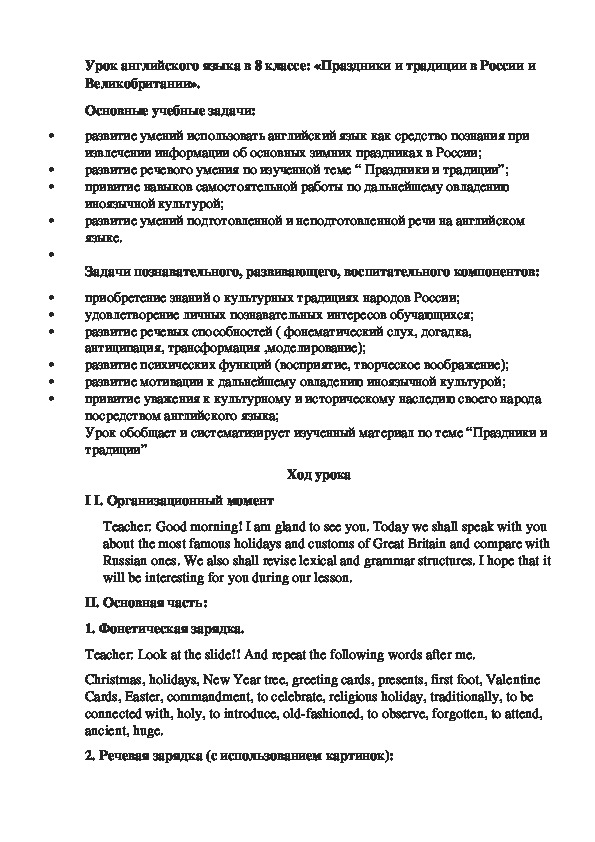Урок английского языка в 8 классе: «Праздники и традиции в России и Великобритании».
Разработки уроков
docx
английский язык
8 кл
13.05.2017

• развитие умений использовать английский язык как средство познания при извлечении информации об основных зимних праздниках в России;
• развитие речевого умения по изученной теме “ Праздники и традиции”;
• приобретение знаний о культурных традициях народов России;
• удовлетворение личных познавательных интересов обучающихся;
• развитие речевых способностей ( фонематический слух, догадка, антиципация, трансформация ,моделирование);
• развитие психических функций (восприятие, творческое воображение);
• развитие мотивации к дальнейшему овладению иноязычной культурой;
• привитие уважения к культурному и историческому наследию своего народа посредством английского языка;
Урок обобщает и систематизирует изученный материал по теме “Праздники и традиции”
urok_angl._yaz.prazdniki_v_rossii_i_velikobr.docx
•
•
•
•
•
•
•
•
•
•
•
Урок английского языка в 8 классе: «Праздники и традиции в России и
Великобритании».
Основные учебные задачи:
развитие умений использовать английский язык как средство познания при
извлечении информации об основных зимних праздниках в России;
развитие речевого умения по изученной теме “ Праздники и традиции”;
привитие навыков самостоятельной работы по дальнейшему овладению
иноязычной культурой;
развитие умений подготовленной и неподготовленной речи на английском
языке.
Задачи познавательного, развивающего, воспитательного компонентов:
приобретение знаний о культурных традициях народов России;
удовлетворение личных познавательных интересов обучающихся;
развитие речевых способностей ( фонематический слух, догадка,
антиципация, трансформация ,моделирование);
развитие психических функций (восприятие, творческое воображение);
развитие мотивации к дальнейшему овладению иноязычной культурой;
привитие уважения к культурному и историческому наследию своего народа
посредством английского языка;
Урок обобщает и систематизирует изученный материал по теме “Праздники и
традиции”
I I. Организационный момент
Ход урока
Teacher: Good morning! I am gland to see you. Today we shall speak with you
about the most famous holidays and customs of Great Britain and compare with
Russian ones. We also shall revise lexical and grammar structures. I hope that it
will be interesting for you during our lesson.
II. Основная часть:
1. Фонетическая зарядка.
Teacher: Look at the slide!! And repeat the following words after me.
Christmas, holidays, New Year tree, greeting cards, presents, first foot, Valentine
Cards, Easter, commandment, to сelebrate, religious holiday, traditionally, to be
connected with, holy, to introduce, oldfashioned, to observe, forgotten, to attend,
ancient, huge.
2. Речевая зарядка (с использованием картинок): T: Make the sentence longer. People like to celebrate Christmas.
P: People like to celebrate Christmas and New Year. (Easter и т.д.)
T: Agree or disagree with my statements. We celebrate New Year on the 1st of
September.
P: That’s wrong. We don’t celebrate New Year on the 1st of Sptember. We
celebrate New Year on the 1st of January.
T: People celebrate Easter in Autumn.
P: That’s wrong. We don’t celebrate Easter in Autumn. People celebrate Easter in
spring.
T: We celebrate Victory Day on the 9th of May.
P: That’s right. We celebrate Victory Day on the 9th of May. И т.д.
T: Answer my questions.
When do we celebrate Victory Day? When do we celbrate New Year? When do
we celbrate Christmas? When do we celebrate Easter? What is the most favorite
holiday in your family? What are the most important public holidays in Great
Britain? What religious holidays do you know? What are the most important
national holidays in Russia? During what holiday do American people eat their
traditional food: roast turkey? Name the date when English people celebrate
Halloween. И т.д.
3. Сообщение о зимних праздниках. Проверка домашнего задания.
(Ученик должен был подготовить сообщения о любимых зимних праздниках в
России).
Task (Задача коммуникативноориентированная).
Your homework was to make reports about Russian Winter Festivals. Please, tell
me about them.
4. Беседа о русских традициях. (Задача обмен мнениями).
T: Singing songs is an old tradition. Songs about winter are very popular, they are
numerous. I want you to name them.(Ученик называет песни ,прославляющие
русскую зиму.)
And what is the most popular song about Russian Winter? (Ученик должен
называть “В лесу родилась ёлочка” сл. Кудашевой, муз. Беркманса. Звучит
мелодия данной песни).
And now I want you to give the main idea of this song very shortly.
P: This song tells us about a firtree. It was born in a deep wood. And in the wood grew tall. Than the fir to the party has come and brought joy to everyone.
T: Remember the most popular song about winter in Britain
(Пеня We wish you a Merry Crismas….)
5. Аудирование, работа с текстом.
Ученик прослушивает текст и выполняют к нему задания.
Teacher: The next task is listening to the text, which is called “More about British
and Russian traditions”. You must listen to the speaker attentively.
Every nation and every country has its own traditions and customs. In Britain
traditions play a more important role in the life of people than in other countries.
They say Britsh people are very conservative. They are proud of their traditions
and carefully keep them up. But when we speak about British traditions we always
remember that there are four parts in Britain – England, Scotland, Wales and
Northern Ireland. Traditions are different in these parts of the country. You already
know some of the English traditions and holidays. We hope you remember St.
Valentine's Day, St.Patrick's Day, Halloween which have also become traditional
American holidays. Here are some more facts about old English traditions. One of
the old English legends says that London can be the capital of the country, rich and
great until twelve black ravens live in the Tower of London. Each has got its name
and the keepers carefully look after them. If one of the birds dies, another younger
raven takes its place. Londoners believe this legend and always bring some food to
give to the birds when they come to the Tower. The keepers cut the bird's wings a
bit as they are afraid that they may fly away. Another old English tradition is Guy
Fawkes Day. Children go out into the streets on the 5th of November with figures
like scarecrows. They stand in the streets and squares asking for the usual “Penny
for the Guy”. Then with the money they have collected they buy fireworks and
burn the guy (the figure like a scarecrow) on their bonfire. People watch fireworks
and some people go to parties in the evening. People in Russia have their own
special traditions. One of them is Maslenitsa – the holiday, which lasts for a week,
to say “goodbye” to winter. People celebrate it at the end of February or at the
beginning of March. During this holiday they celebrate the end of winter and the
beginning of spring. In old times people usually cooked pancakes, had fires, burnt
straw scarecrows of winter, they sang songs and danced. Now during “Maslenitsa
week” people always cook pancakes. They invite their friends, their nearest to see
each other and eat pancakes with sour cream, fish, caviar or butter, sugar, honey.
Though different countries have different traditions and holidays people all over
the world know some of them. They are – Easter, Ghristmas and New Year.
T: I shall give you these cards and you should write “False” or “True”.
Slide 1. Every country has its own traditions and customs.
2. There are no common traditions all over the world.
3. English people celebrate Maslenitsa.
4. There are some common holidays in England, Scotland< Wales and Northern
Ireland.
5. London can be great until 10 black ravens live in the Tower.
6. English people celebrate Guy Fawkes Day on the 5th of November.
7. Russian people seldom eat pancakes with caviar now.
III Заключительный этап урока.
Подведение итогов урока
Подведение итогов деятельности ученика
Создание мотивации ожидания следующего урока
Дом зад
Teacher: Now I want to tell you some words in conclusion. Though different
traditions and holidays people all over the world know some of them. They are
Christmas, New Year, Easter. But we have also known to celebrate Shrovetide is a
Russian tradition. Life is constantly changing in Russia. Some holidays have
become history. New holidays have appeared. In spite of some of them are
constantly.
Your homework is to write a minicomposition “A link between Russian and
British traditions and celebrations”.
Teacher: Please, tell me your opinions about our lesson.
Was it interesting for you?
Were you active?
•
•
Материалы на данной страницы взяты из открытых истончиков либо размещены пользователем в соответствии с договором-офертой сайта. Вы можете сообщить о нарушении.
13.05.2017
Посмотрите также:
© ООО «Знанио»
С вами с 2009 года.
![]()
О портале

